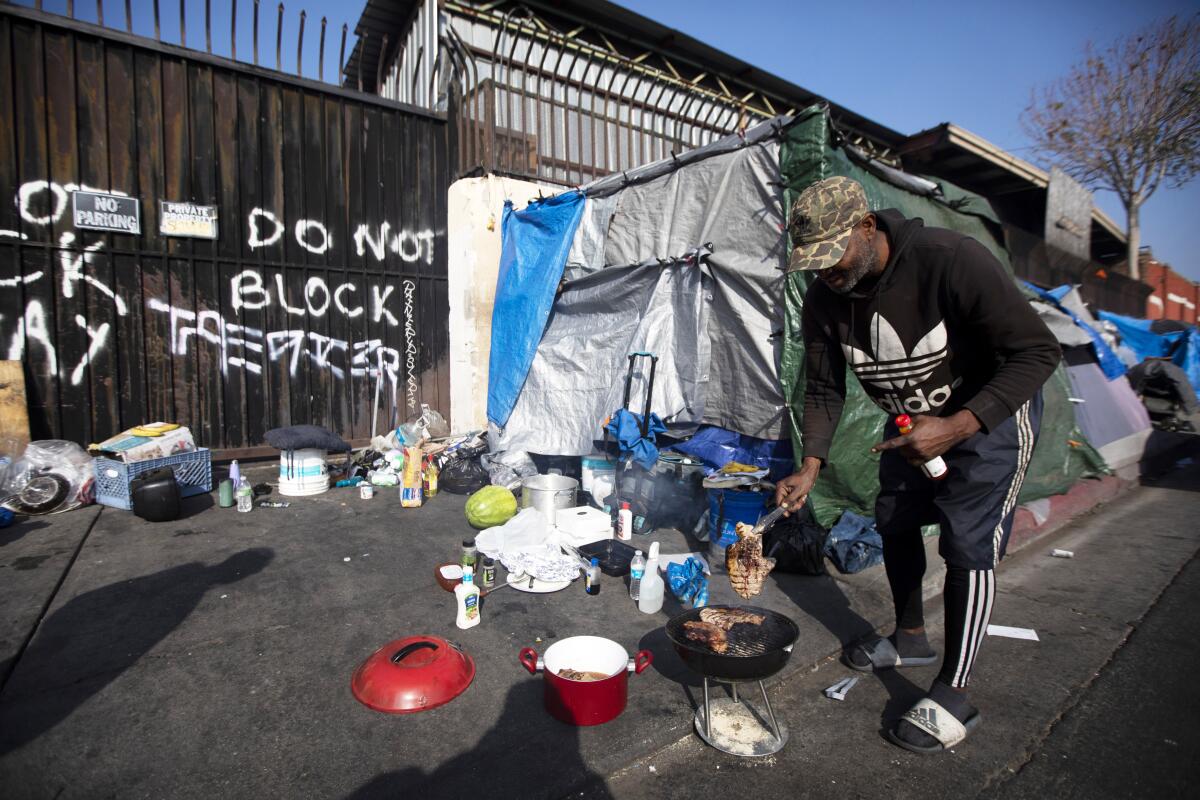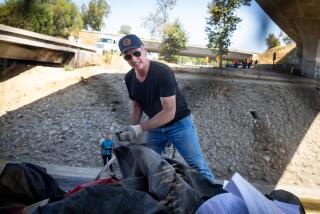Editorial: An order to shelter all of skid row is not a permanent path out of skid row

- Share via
Judge David O. Carter’s order requiring the city of Los Angeles to set aside $1 billion and shelter or house every homeless person on skid row (roughly 4,600 people at last count) over the next three to six months is a blunt command that sounds good in theory, but might well set back the city’s existing and newly proposed homelessness programs and housing efforts.
Carter’s order came in a lawsuit against the city and county of Los Angeles by the L.A. Alliance for Human Rights, a group of downtown business owners and residents who contend the city and county have turned skid row into a physical and mental health crisis zone for unhoused people.
We all share Carter’s outrage at the squalid conditions there and the actions (and inactions) by elected officials that allowed homelessness to metastasize. But this order is by no means a panacea. It will force the city to rapidly set up shelters, tent cities and other forms of temporary housing that people on skid row may or may not accept. Either way, this won’t automatically get them out of homelessness. What homeless people across L.A. need to get out of homelessness starts with permanent housing.
Carter’s order traces a long history of discriminatory moves by city and county officials that led to homelessness among Black and Latino Angelenos, then corralled the victims of those policies into skid row, where they would be invisible to much of the population. Yet he also expresses a deep and justifiable frustration with the current crop of local leaders. “City and County officials are content to pay soundbite lip service instead of declaring an emergency and taking steps to correct the problems that plague their communities,” he writes at one point. Later, he adds, “The disconnect between politicians’ public statements about the severity of this crisis and the actual efforts made to fund effective solutions is growing.”
Mayor Eric Garcetti, in particular, is a target of Carter’s scorn. The judge quotes repeatedly from the mayor’s speeches decrying homelessness, but notes, “To this day, Mayor Garcetti has not employed the emergency powers given to him by the City Charter despite overwhelming evidence that the magnitude of the homelessness crisis is ‘beyond the control of the normal services’ of the City government.”
Less than 24 hours before Carter issued his order, Garcetti released his budget for the fiscal year that starts July 1. The mayor dubbed his $11.2-billion spending plan the “justice budget” because it proposes nearly $1 billion in funding for homelessness programs, along with tens of millions of dollars in federal relief to fund anti-poverty and social justice programs. More than a third of that funding is bond money from Proposition HHH for specific housing construction projects, albeit ones that may not be finished anytime soon.
Taking a dig at Garcetti’s rhetoric, Carter ordered the city to place “$1 billion, as represented by Mayor Garcetti,” into an escrow account in seven days. Does the city even have $1 billion on hand? Again, the frustration is understandable. But is Carter’s order feasible?
And what about the repercussions for the rest of the 41,000 homeless people throughout the city? There is no acknowledgement of the tradeoffs, or what programs and efforts will be delayed or canceled to fulfill Carter’s vision for skid row. What about vital homelessness prevention and rental assistance programs? Will the city still be able to launch important anti-poverty and public-safety pilot projects, like the $24-million guaranteed income program that would give $1,000 a month for a year to 2,000 households? Or the $18.7-million program to send crisis counselors and mental health clinicians to nonviolent 911 calls?
Garcetti offered this message to Carter on Tuesday afternoon: “I would say, ‘Stay out of our way.’ Roadblocks masquerading as a progress are the last thing we need.”
The mayor also said he wants to sit down with the judge to work out a settlement. As those discussions proceed, local officials and Carter need to think carefully about what comes next. Giving homeless people — including the disproportionate number of Black people in that population — interim shelter may get them off a dirty sidewalk, at least temporarily, but it won’t be enough to put them on a path toward some semblance of a sustainable, decent life. The problems of homeless people on skid row, and across this region, require more than one judge’s preliminary injunction.
More to Read
A cure for the common opinion
Get thought-provoking perspectives with our weekly newsletter.
You may occasionally receive promotional content from the Los Angeles Times.










